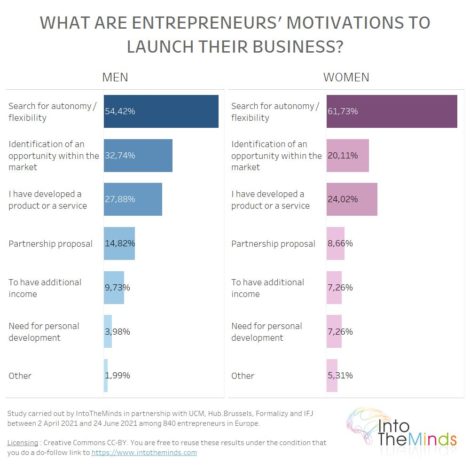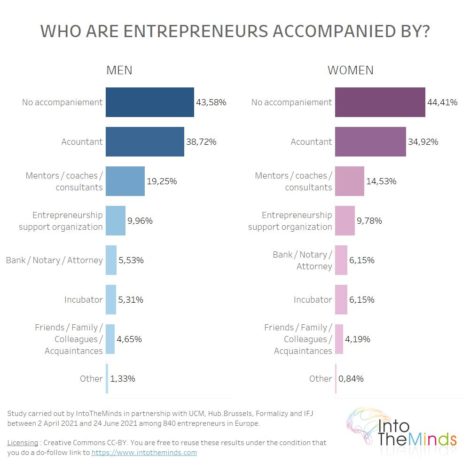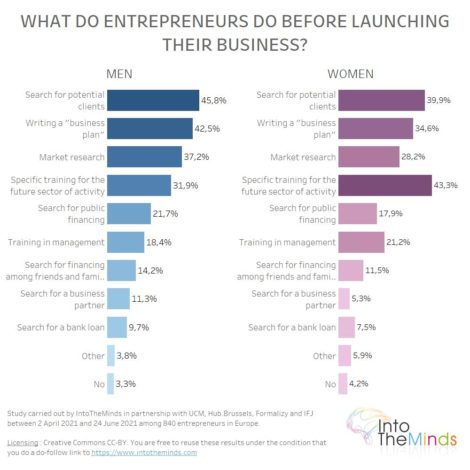Starting a business is a complex adventure. The research we conducted with 840 European entrepreneurs shows that there are fundamental differences related to gender. This affects the dynamics of female entrepreneurship. Women and men don’t do business in the same way, which has practical consequences on their chances of success.
In this article, we reveal the results of our research and outline solutions to address these differences. If you are a journalist and would like to use some of the marks or get more information, don’t hesitate to contact us at +32 2 347 45 86.
Summary
- Statistics: the differences between male and female entrepreneurship
- Global analysis
- Difference 1: motivations
- Difference 2: support
- Difference 3: training
- Difference 4: confidence
- Difference 5: experience
- Difference 6: partners
- Difference 7: entrepreneurial spirit
- Methodology
Statistics: the differences between male and female entrepreneurship
- Men and women have different motivations for becoming entrepreneurs. Women’s number one preparatory activity is specific training (61.7% versus 54.2%). Their creation of activity is less opportunistic since only 20.1% of them declare to have identified an opportunity on the market (against 32.7% for men)
- There are no fundamental differences in support between men and women. The majority of entrepreneurs do not seek support (approximately 44%). The accountant remains the number one reference point, and entrepreneurship support organizations attract less than 1 in 10 entrepreneurs.
- Men and women do not prepare for the launch of their business in the same way. The number one preparatory activity for women is specific training (43.3% versus 31.8% for men). Men are looking for potential clients (45.8%) and writing a business plan (42.5% versus 34.6% for women).
- Market research is carried out by about 1/3 of men and 1/4 of women.
- Women entrepreneurs are much less experienced than their male counterparts: 37.5% have less than 3 years of experience versus 25.7% of men.
- 82.5% of women start businesses alone (compared to 69.8% of men)
- Men consider that they are more entrepreneurial than women (84.7% of men against 72% of women)
- Men have much more confidence in the future than women (48.2% of women vs. 64.7% of men)
- Men are clearly more confident in the success of their company than women: 72.4% versus 65.3
- There are far more unemployed women than men among entrepreneurs: 25.9% versus 16.9
- Women are 3 times less likely than men to have already tried the adventure of creating a business: only 5.3% of women had already created a business against 18.4% of men
Analysis
The study reveals significant differences in male and female entrepreneurship. While it was to be expected that the motivations for starting a business would differ between men and women, what our study reveals is that the differences are more profound. They affect both the framework of the entrepreneurial activity and the personality.
These factors add up and can be seen, in the end, as obstacles to female entrepreneurship.
In addition to the lack of confidence of women compared to men, female entrepreneurship shows characteristics that are likely to reduce the chances of success of the companies created:
- women are more likely to be solo entrepreneurs and to associate less than men
- only 1 woman in 20 has a first entrepreneurial experience (compared to 1 man in 5)
- women have less professional experience when they start their business
The entrepreneurial journey is paved with difficulties. Resilience is often cited as a quality essential to success and, more prosaically, to the company’s survival. Knowing how to surround oneself with people is vital to get through the difficulties of entrepreneurship and avoid giving up among solo entrepreneurs.
We believe that actual work must be done to make women aware of the importance of surrounding themselves. The use of external advice should be made more accessible and the search for a partner.
This would make it possible to gather more skills around the project and detect its weaknesses and strengths upstream (notably via market research and the business plan, which women use less than men).
1. Men and women have different motivations to become entrepreneurs

- The 1st motivation of women is the search for autonomy and flexibility. This motivation is almost 3 times higher than those in 2nd and 3rd position.
- Women are less motivated than men by the identification of an opportunity in the market. There is a differential of more than 12 points between men and women
2. Support: a structural weakness regardless of gender

As far as female entrepreneurship is concerned, the table below shows that support is even weaker. Women make even less use of accountants (34.9% compared to 38.7% for men) and external consultants (14.5% compared to 19.2% for men).
This lack of support is probably already reflected in the figures for pre-launch activities (see next paragraph).
3. Women are more likely to train than men

All other types of preparation are more common among men than women: writing a business plan, market research, seeking public financing, finding a partner.
How can we interpret these figures?
Objectively, the level of women’s education in our sample is almost the same as that of men. We can even say that the women in our example are more educated since 71.2% have a university degree than 68.2% of the men.
The answer to this question is complex, and we believe that it is a combination of factors that we will explain below.
4. Women feel less confident than men
That’s another surprise from this research. Women are clearly less confident than men.
Is it the impostor syndrome or a natural tendency to be cautious? The fact is that women are more reserved than men when asked about their chances of success. Men are 72.4% confident or very confident in their success; women 65.3%.
The same is true when women are asked about their confidence in the future. 64.7% of men are very confident or confident in the future, compared to 48.2% of women.
This lack of confidence may explain the need for more training.
5. Women who start their own business are on average less experienced than men
Work experience is the other explanatory factor we put forward. As the graph below clearly shows, women who start their business have less professional experience than their male counterparts. 34.1% of women have more than 10 years of experience against 47.1% of men.
We also note that the share of women with less than 3 years of professional experience is almost 12 points higher than men’s (37.5% versus 25.7%).
Objectively, women also have less entrepreneurial experience. Nearly 95% of them are starting a business for the first time, compared to 81.6% of men.
This lack of experience may be a primary factor in women’s need for additional training.
6. Women entrepreneurs can only count on themselves
Women are more likely to be solo entrepreneurs than men. 82.5% of women are solo entrepreneurs (compared to 69.8% of men), and they are almost half as likely to have a partner as men (12.4% compared to 22.9%). Since they can only rely on themselves, they may feel a greater need for ad hoc training.
7. Women feel less “entrepreneurial” than men
A final possible explanation lies in women’s perception of their “entrepreneurial fiber. When asked about this point, women entrepreneurs perceive their entrepreneurial spirit less than men. This is paradoxical, to say the least, because, in the end, all of the people surveyed had started their own business.
Why should women doubt their abilities?
Methodology
An online survey was carried out between April 2, 2021, and June 24, 2021, among 840 business creators in Europe.
The survey was conducted in partnership with IFJ (Switzerland), Formalizi (France), UCM (Belgium), and Hub.Brussels (Belgium).
358 women and 482 men responded to the survey, i.e., a 42.6% / 57.4% distribution
29% of the respondents had created their business before covid, and 71% after.
33.2% of respondents had created their business before covid, 66.8% after.
Posted in Entrepreneurship, Research.







2 April 2022
Excellent article, so true. Gender stereotypes coming from early age yet in our own families heavily influence the entrepreneurial spirit of girls and women.
10 March 2023
Good one, thanks! There’s a logic behind those numbers, as women have less time being entrepreneurs than men. At the same time, I don’t see why we can’t ask advices from one another. According to the statistics, each of us have what the other lacks. I am a woman who works in Contenteam, an agency that requires knowledge in IT, SEO, trading, etc, so there are many men. But somehow we manage to keep a healthy work balance and stay open – no fighting.